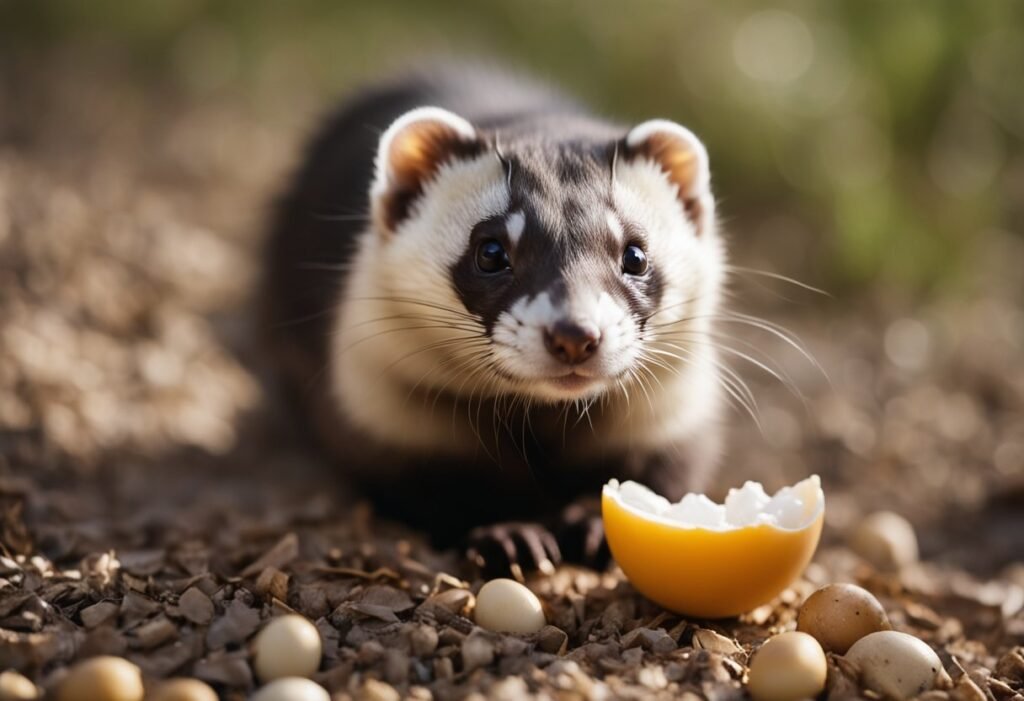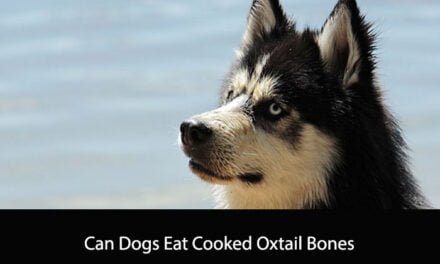Ferrets are adorable and playful pets that are known for their curious nature. As a ferret owner, it is important to ensure that your furry friend is getting a well-balanced diet. One question that often arises is whether or not ferrets can eat raw eggs.

Raw eggs are a good source of protein, and many people assume that they are a healthy addition to their pet’s diet. However, there are some risks associated with feeding raw eggs to ferrets. Raw eggs can contain harmful bacteria such as Salmonella and E. coli, which can cause serious health problems for your pet. In addition, raw egg whites contain avidin, which can interfere with the absorption of biotin, a B vitamin that is essential for your ferret’s health.
Can Ferrets Eat Raw Eggs?
Ferrets are obligate carnivores, which means that their diet should primarily consist of meat. However, some ferret owners may wonder if they can feed their pets raw eggs as a source of protein.
While raw eggs are not toxic to ferrets, there are some potential risks to consider. Raw eggs may contain salmonella, which can cause illness in both humans and animals. Additionally, raw egg whites contain avidin, which can bind to biotin and prevent its absorption in the body. Biotin is an essential vitamin for ferrets that helps maintain healthy skin and coat.
If you choose to feed your ferret raw eggs, it’s important to take precautions to reduce the risk of salmonella. Make sure to thoroughly wash the egg before cracking it open, and avoid feeding your ferret eggs that are past their expiration date. It’s also a good idea to limit the amount of raw eggs your ferret consumes and offer them as an occasional treat rather than a regular part of their diet.
Overall, while raw eggs are not toxic to ferrets, it’s important to weigh the potential risks before feeding them to your pet. A balanced diet consisting of high-quality meat-based cat food is the best way to ensure your ferret gets the nutrients they need to stay healthy.
Nutritional Needs of Ferrets
Ferrets are obligate carnivores, meaning that they require a diet high in animal protein to thrive. In the wild, ferrets primarily consume small prey such as rodents and birds. As such, their nutritional needs are quite different from those of omnivorous pets like dogs and cats.
Protein Requirements
Protein is essential for the growth, maintenance, and repair of tissues in the body. Ferrets require a diet that is at least 32% protein on a dry matter basis. This is because they have a high metabolic rate and a short digestive tract, which means that they need a steady supply of protein to maintain their energy levels and overall health.
Fat Requirements
Fat is another important nutrient for ferrets, as it provides a concentrated source of energy and helps to maintain healthy skin and coat. In general, ferrets require a diet that is at least 15% fat on a dry matter basis. However, it is important to note that not all fats are created equal. Ferrets require a balance of omega-3 and omega-6 fatty acids, which can be found in animal-based fats such as chicken fat and fish oil.
Vitamin and Mineral Needs
In addition to protein and fat, ferrets require a range of vitamins and minerals to maintain their health. Some of the most important nutrients for ferrets include:
- Vitamin A: Essential for vision, immune function, and skin health.
- Vitamin D: Necessary for the absorption of calcium and phosphorus, which are important for bone health.
- Calcium: Crucial for bone health and muscle function.
- Phosphorus: Important for bone health and energy metabolism.
- Taurine: Essential for heart and eye health.
It is important to note that ferrets have specific nutritional needs that cannot be met by a diet designed for another species. While raw eggs may be a good source of protein for some animals, they are not a complete or balanced diet for ferrets. Ferrets require a diet that is specifically formulated to meet their unique nutritional needs.
Understanding Raw Diets for Ferrets

Ferrets are obligate carnivores, which means that their diet should mainly consist of meat. Raw diets for ferrets have been gaining popularity among pet owners, but it is important to understand the benefits and risks associated with this type of feeding.
Benefits of Raw Feeding
Raw diets for ferrets can offer several benefits, including:
- Improved digestion: Raw diets can be easier for ferrets to digest compared to processed foods, which can contain fillers and additives that may cause digestive issues.
- Increased nutrient absorption: Raw diets can provide more bioavailable nutrients compared to processed foods, which can lose some of their nutritional value during the cooking process.
- Better dental health: Raw diets can help keep ferrets’ teeth clean and healthy, as they require more chewing compared to processed foods.
Risks of Raw Diets
While raw diets for ferrets can offer benefits, there are also risks associated with this type of feeding, such as:
- Nutritional imbalances: Raw diets need to be carefully balanced to ensure that ferrets are getting all the necessary nutrients they need. Feeding an unbalanced raw diet can lead to nutrient deficiencies or excesses, which can cause health problems.
- Bacterial contamination: Raw meat can contain harmful bacteria such as Salmonella and E. coli, which can cause illness in ferrets and their owners. It is important to handle raw meat safely and ensure that it is sourced from a reliable supplier.
- Cost and convenience: Raw diets can be more expensive and time-consuming compared to processed foods, as they require more preparation and may need to be sourced from specialty suppliers.
In conclusion, raw diets for ferrets can offer benefits, but they also come with risks. It is important to carefully research and plan a balanced raw diet, and to handle raw meat safely to minimize the risk of bacterial contamination. Ferret owners should also consider the cost and convenience of raw feeding before making the switch.
Safety of Raw Eggs for Ferrets
Ferrets are obligate carnivores and require a diet that is high in protein and fat. Raw eggs are a good source of protein and are often included in the diet of many pets, including ferrets. However, there are some safety concerns when it comes to feeding raw eggs to ferrets.
Salmonella Risk
Raw eggs can be contaminated with Salmonella, a type of bacteria that can cause food poisoning in humans and animals. Ferrets are susceptible to Salmonella infections and can become sick if they consume contaminated food. Symptoms of Salmonella infection in ferrets include diarrhea, vomiting, and lethargy.
To reduce the risk of Salmonella infection, it is important to handle raw eggs properly. Ferret owners should wash their hands thoroughly before and after handling raw eggs and should clean any surfaces or utensils that come into contact with the eggs. It is also recommended to feed raw eggs in moderation and to only use fresh eggs that have been stored properly.
Biotin Deficiency Concerns
Raw egg whites contain avidin, a protein that binds to biotin and prevents its absorption. Biotin is an essential vitamin that is important for healthy skin and coat, as well as for the metabolism of fats and carbohydrates. If a ferret consumes too much raw egg white, it can lead to a biotin deficiency, which can cause skin problems, hair loss, and other health issues.
To avoid biotin deficiency, it is recommended to feed raw egg yolks instead of raw egg whites. Egg yolks are a good source of biotin and do not contain avidin. Ferret owners should also feed a balanced diet that includes other sources of biotin, such as meat and organ meats.
In conclusion, while raw eggs can be a nutritious addition to a ferret’s diet, it is important to handle them properly and feed them in moderation. Ferret owners should be aware of the potential risks of Salmonella contamination and biotin deficiency and take steps to prevent these issues.
Proper Feeding Practices
How to Introduce Raw Eggs
When introducing raw eggs to a ferret’s diet, it is important to do so gradually. This will allow their digestive system to adjust and prevent any potential digestive upset. One way to do this is by starting with a small amount of egg mixed in with their regular food. Over time, the amount of egg can be increased until it makes up a larger portion of their diet.
It is also important to ensure that the eggs are fresh and of high quality. Any eggs that are cracked or have a strange odor should be discarded. Additionally, it is recommended to wash the eggs before feeding them to the ferret to reduce the risk of bacterial contamination.
Frequency of Feeding Raw Eggs
Raw eggs can be a nutritious addition to a ferret’s diet, but it is important to feed them in moderation. Too much egg can lead to an imbalance in the ferret’s diet and potentially cause health issues. It is recommended to feed raw eggs to ferrets no more than once or twice a week.
It is also important to note that raw eggs should not be the sole source of nutrition for a ferret. They should be fed a balanced diet that includes a variety of protein sources, as well as fruits and vegetables.
In summary, introducing raw eggs to a ferret’s diet should be done gradually and in moderation. Fresh, high-quality eggs should be used and they should not be the sole source of nutrition for the ferret. By following these proper feeding practices, ferret owners can provide their pets with a nutritious and balanced diet.
Alternatives to Raw Eggs
Cooked Eggs
Cooked eggs are a great alternative to raw eggs for ferrets. Ferrets can eat both the egg yolk and egg white, which are packed with protein and other essential nutrients. Cooked eggs can be scrambled, boiled, or fried, but it is important to avoid adding any seasoning or spices as they can be harmful to ferrets.
Commercial Ferret Foods
Commercial ferret foods are another great alternative to raw eggs. These foods are formulated to meet the nutritional needs of ferrets and often contain a variety of protein sources, including eggs. It is important to choose a high-quality commercial ferret food that is made with real meat and does not contain any fillers or artificial ingredients.
When choosing an alternative to raw eggs, it is important to consider the nutritional needs of your ferret and consult with a veterinarian if you have any concerns. Providing a balanced and varied diet is key to keeping your ferret healthy and happy.
Frequently Asked Questions
Is it safe for ferrets to consume raw egg yolks?
Yes, it is generally safe for ferrets to consume raw egg yolks. Egg yolks are a good source of protein, fat, and essential vitamins and minerals that can benefit a ferret’s health. However, it is important to note that raw egg whites contain avidin, which can bind to biotin and prevent its absorption. Therefore, it is recommended to separate the egg white from the yolk before feeding it to your ferret.
How often can ferrets be fed raw eggs?
Ferrets can be fed raw egg yolks once or twice a week as a treat. It is important to remember that raw eggs should not be the main staple of a ferret’s diet. A balanced diet that includes high-quality ferret food and occasional treats like raw eggs can help keep your ferret healthy.
Should ferrets be given egg whites or whole raw eggs?
It is recommended to give ferrets only the egg yolk and avoid feeding them raw egg whites. Raw egg whites contain avidin, which can prevent biotin absorption and lead to biotin deficiency in ferrets. Whole raw eggs can also be given, but it is important to ensure that the egg is fresh and not contaminated with bacteria.
Can feeding eggshells to ferrets provide any nutritional benefits?
Eggshells can be a good source of calcium for ferrets. However, it is important to crush the eggshells into small pieces and mix them with your ferret’s food to prevent choking and ensure proper digestion.
Are cooked eggs like boiled or scrambled suitable for ferrets?
Cooked eggs like boiled or scrambled eggs can be given to ferrets as an occasional treat. However, it is important to avoid adding any seasoning or cooking oil to the eggs, as these can be harmful to ferrets. It is also important to ensure that the eggs are fully cooked to prevent the risk of bacterial contamination.
What are appropriate treat options for ferrets besides raw eggs?
There are many appropriate treat options for ferrets besides raw eggs, such as small pieces of cooked chicken or turkey, freeze-dried meat treats, and small amounts of fresh fruits and vegetables. It is important to remember that treats should not make up more than 10% of a ferret’s diet and should be given in moderation.





